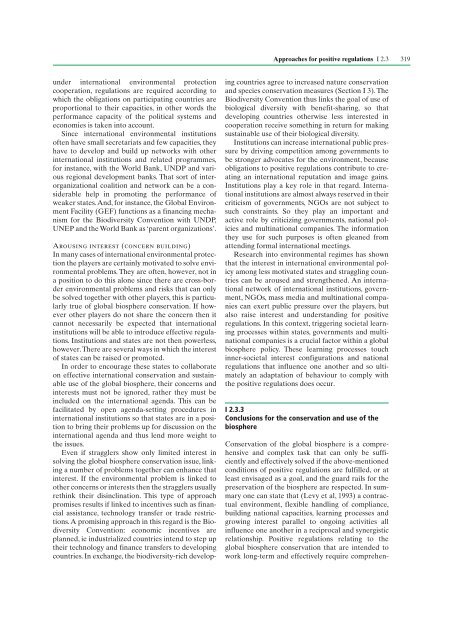Conservation and Sustainable Use of the Biosphere - WBGU
Conservation and Sustainable Use of the Biosphere - WBGU
Conservation and Sustainable Use of the Biosphere - WBGU
Create successful ePaper yourself
Turn your PDF publications into a flip-book with our unique Google optimized e-Paper software.
Approaches for positive regulations I 2.3<br />
319<br />
under international environmental protection<br />
cooperation, regulations are required according to<br />
which <strong>the</strong> obligations on participating countries are<br />
proportional to <strong>the</strong>ir capacities, in o<strong>the</strong>r words <strong>the</strong><br />
performance capacity <strong>of</strong> <strong>the</strong> political systems <strong>and</strong><br />
economies is taken into account.<br />
Since international environmental institutions<br />
<strong>of</strong>ten have small secretariats <strong>and</strong> few capacities, <strong>the</strong>y<br />
have to develop <strong>and</strong> build up networks with o<strong>the</strong>r<br />
international institutions <strong>and</strong> related programmes,<br />
for instance, with <strong>the</strong> World Bank, UNDP <strong>and</strong> various<br />
regional development banks. That sort <strong>of</strong> interorganizational<br />
coalition <strong>and</strong> network can be a considerable<br />
help in promoting <strong>the</strong> performance <strong>of</strong><br />
weaker states.And, for instance, <strong>the</strong> Global Environment<br />
Facility (GEF) functions as a financing mechanism<br />
for <strong>the</strong> Biodiversity Convention with UNDP,<br />
UNEP <strong>and</strong> <strong>the</strong> World Bank as ‘parent organizations’.<br />
Arousing interest (concern building)<br />
In many cases <strong>of</strong> international environmental protection<br />
<strong>the</strong> players are certainly motivated to solve environmental<br />
problems. They are <strong>of</strong>ten, however, not in<br />
a position to do this alone since <strong>the</strong>re are cross-border<br />
environmental problems <strong>and</strong> risks that can only<br />
be solved toge<strong>the</strong>r with o<strong>the</strong>r players, this is particularly<br />
true <strong>of</strong> global biosphere conservation. If however<br />
o<strong>the</strong>r players do not share <strong>the</strong> concern <strong>the</strong>n it<br />
cannot necessarily be expected that international<br />
institutions will be able to introduce effective regulations.<br />
Institutions <strong>and</strong> states are not <strong>the</strong>n powerless,<br />
however.There are several ways in which <strong>the</strong> interest<br />
<strong>of</strong> states can be raised or promoted.<br />
In order to encourage <strong>the</strong>se states to collaborate<br />
on effective international conservation <strong>and</strong> sustainable<br />
use <strong>of</strong> <strong>the</strong> global biosphere, <strong>the</strong>ir concerns <strong>and</strong><br />
interests must not be ignored, ra<strong>the</strong>r <strong>the</strong>y must be<br />
included on <strong>the</strong> international agenda. This can be<br />
facilitated by open agenda-setting procedures in<br />
international institutions so that states are in a position<br />
to bring <strong>the</strong>ir problems up for discussion on <strong>the</strong><br />
international agenda <strong>and</strong> thus lend more weight to<br />
<strong>the</strong> issues.<br />
Even if stragglers show only limited interest in<br />
solving <strong>the</strong> global biosphere conservation issue, linking<br />
a number <strong>of</strong> problems toge<strong>the</strong>r can enhance that<br />
interest. If <strong>the</strong> environmental problem is linked to<br />
o<strong>the</strong>r concerns or interests <strong>the</strong>n <strong>the</strong> stragglers usually<br />
rethink <strong>the</strong>ir disinclination. This type <strong>of</strong> approach<br />
promises results if linked to incentives such as financial<br />
assistance, technology transfer or trade restrictions.A<br />
promising approach in this regard is <strong>the</strong> Biodiversity<br />
Convention: economic incentives are<br />
planned, ie industrialized countries intend to step up<br />
<strong>the</strong>ir technology <strong>and</strong> finance transfers to developing<br />
countries. In exchange, <strong>the</strong> biodiversity-rich developing<br />
countries agree to increased nature conservation<br />
<strong>and</strong> species conservation measures (Section I 3). The<br />
Biodiversity Convention thus links <strong>the</strong> goal <strong>of</strong> use <strong>of</strong><br />
biological diversity with benefit-sharing, so that<br />
developing countries o<strong>the</strong>rwise less interested in<br />
cooperation receive something in return for making<br />
sustainable use <strong>of</strong> <strong>the</strong>ir biological diversity.<br />
Institutions can increase international public pressure<br />
by driving competition among governments to<br />
be stronger advocates for <strong>the</strong> environment, because<br />
obligations to positive regulations contribute to creating<br />
an international reputation <strong>and</strong> image gains.<br />
Institutions play a key role in that regard. International<br />
institutions are almost always reserved in <strong>the</strong>ir<br />
criticism <strong>of</strong> governments, NGOs are not subject to<br />
such constraints. So <strong>the</strong>y play an important <strong>and</strong><br />
active role by criticizing governments, national policies<br />
<strong>and</strong> multinational companies. The information<br />
<strong>the</strong>y use for such purposes is <strong>of</strong>ten gleaned from<br />
attending formal international meetings.<br />
Research into environmental regimes has shown<br />
that <strong>the</strong> interest in international environmental policy<br />
among less motivated states <strong>and</strong> straggling countries<br />
can be aroused <strong>and</strong> streng<strong>the</strong>ned. An international<br />
network <strong>of</strong> international institutions, government,<br />
NGOs, mass media <strong>and</strong> multinational companies<br />
can exert public pressure over <strong>the</strong> players, but<br />
also raise interest <strong>and</strong> underst<strong>and</strong>ing for positive<br />
regulations. In this context, triggering societal learning<br />
processes within states, governments <strong>and</strong> multinational<br />
companies is a crucial factor within a global<br />
biosphere policy. These learning processes touch<br />
inner-societal interest configurations <strong>and</strong> national<br />
regulations that influence one ano<strong>the</strong>r <strong>and</strong> so ultimately<br />
an adaptation <strong>of</strong> behaviour to comply with<br />
<strong>the</strong> positive regulations does occur.<br />
I 2.3.3<br />
Conclusions for <strong>the</strong> conservation <strong>and</strong> use <strong>of</strong> <strong>the</strong><br />
biosphere<br />
<strong>Conservation</strong> <strong>of</strong> <strong>the</strong> global biosphere is a comprehensive<br />
<strong>and</strong> complex task that can only be sufficiently<br />
<strong>and</strong> effectively solved if <strong>the</strong> above-mentioned<br />
conditions <strong>of</strong> positive regulations are fulfilled, or at<br />
least envisaged as a goal, <strong>and</strong> <strong>the</strong> guard rails for <strong>the</strong><br />
preservation <strong>of</strong> <strong>the</strong> biosphere are respected. In summary<br />
one can state that (Levy et al, 1993) a contractual<br />
environment, flexible h<strong>and</strong>ling <strong>of</strong> compliance,<br />
building national capacities, learning processes <strong>and</strong><br />
growing interest parallel to ongoing activities all<br />
influence one ano<strong>the</strong>r in a reciprocal <strong>and</strong> synergistic<br />
relationship. Positive regulations relating to <strong>the</strong><br />
global biosphere conservation that are intended to<br />
work long-term <strong>and</strong> effectively require comprehen-

















